Bluebeard’s Castle: a bold, brilliant reimagining of Bartók’s opera
Susan Bullock (Judith) and Lester Lynch (Bluebeard) in Bluebeard’s Castle
Image credit: Latitude Creative
The dramatic trajectory of this contemporary production of Bluebeard's Castle is vivid and deeply moving from its opening bars till the passionate conclusion. Created by the UK company Theatre of Sound, and presented by NZSO and NZ Opera, it opened in Wellington this week and will also be performed in Christchurch. For me, its greatest wonder is the faithful use of the original text and music to tell a tragic story of today, a superb creative reimagining of Bartók 's only opera.
Bartók wrote Bluebeard's Castle in 1911. He was 30 years old. The Gothic work, with a libretto by the composer's friend, poet Béla Balázs, was based on the French folk tale published in the 17th century by Charles Perrault. Disappointingly for Bartók, it was not accepted for performance at the time, and waited seven years for its premiere.
As we know, 1918 was a terrible year in Europe. Well before World War 1 ended in November, the Austro-Hungarian Empire was weakened by crop failure, widespread starvation and the 1918 'flu pandemic. And yet, in May, Bluebeard's Castle, with some revisions by Bartók, had its premiere at the Royal Hungarian Opera House in Budapest, under the baton of Egisto Tango.
The opera has a singing cast of two with a full orchestra. The role of Bluebeard is sung in this New Zealand performance by US baritone Lester Lynch, and his wife Judith by UK soprano Susan Bullock. As the semi-staged production opens, the strings of the NZSO set a rather creepy mood. The couple arrive onstage, Judith appearing confused and troubled. “If you left me, I’d be lost and all alone here,” she sings.
In the original, Judith was Bluebeard’s very young wife, brought to his cold, dark castle and confronted by seven locked doors, which open in turn throughout the opera, revealing their disturbing contents. The Theatre of Sound, with director Daisy Evans and her colleague Stephen Higgins, have boldly brought the story into the present. Judith has dementia and Bluebeard - "darling Bluebeard" - is her devoted carer. The darkness and shadows of the libretto are in her mind. The locked doors are replaced by a suitcase, and from it are drawn contents representing memories of Judith’s life and their relationship.
Bluebeard’s Castle is often described as a Symbolist opera and symbolism remains strong in this production. Part of this is the music, marvellously played by the full forces of the NZSO under Dutch-Maltese conductor Lawrence Renes. This is the writing of a young Bartók, strongly influenced by Romantic composers and Debussy, and his score, including the challenging and chromatic vocal lines, is beautiful, colourful and lush. It is also highly dramatic and alongside the theatrical symbolism are meaningful musical motives, most noticeable the “blood” motive of a minor second, a semitone, appearing whenever Judith, remembering past losses and fears, refers to blood.
Orchestral colours, beautifully painted, express the intense relationship of the protagonists. Low strings and cor anglais, harp and horns draw us into their anguished domestic world. Visual colour was used very deliberately in the original Bluebeard’s Castle a century ago, with stage directions assigning particular colours to each of the seven doors. In this staging, young actors represent the couples’ children and Judith’s younger selves, and the production keeps faith with those original colours, a gold veil for the bride of the third “Treasury” door, for instance, as happy bells ring from the orchestra, and later black for the grief of the sixth, “the pool of tears”, recalling the death of a child, a young mother howling at a graveside as the lighting fades.
Bullock and Lynch are both outstanding opera singers and fine actors, and their compelling performances draw the audience into a distressing story. These are big roles, both singing constantly throughout the one-hour opera, traversing a great range of emotions and music to match. Bullock’s beautiful soprano soars over the orchestra, with only fleeting moments when the MFC acoustics challenge vocal/orchestral balance. The warmth and resonance of Lynch’s baritone reinforces his empathetic and emotionally open character.
A final “door” brings the impassioned denouement. "When this door is opened, Judith, you will find my wife there waiting”, sings Bluebeard, handing her a mirror from the suitcase. The poetry in the libretto really blooms here, as Bluebeard sings of his former wives, the young lover, wife of the dawn, the young wife of his “noontime”, the mother, wife of his evening.
Bluebeard (Lester Lynch) sings to his wife Judith (Susan Bullock) as the opera reaches its romantic climax.
Image credit: Latitude Creative
The younger wives return, also holding mirrors, and as Bluebeard sings of each, Judith offers a repetitive and sad little refrain from her chair. "Ah, compared to her, I am nothing.” But she is, he tells her, his wife of the night. Musically, Bartók brings the opera to its big romantic climax. "Eternal beauty!" sings Bluebeard. "Now, all turns to darkness."
The mood in music and staging fades quietly. Tenderly, Bluebeard brings Judith a cup of tea. The lights also fade to blackness. In the audience, we sat for a long moment in the dark, silent and deeply moved, before anyone clapped. Then came a big ovation, with shouts of ‘bravo, brava’, and several curtain calls.
Bluebeard’s Castle, an opera by Béla Bartók, in a production by Theatre of Sound (UK), presented by NZSO and NZ Opera, with soprano Susan Bullock (Judith), baritone Lester Lynch (Bluebeard), Lawrence Renes (Conductor) Daisy Evans (Director and translator), Stephen Higgins (Revival director). Wellington August 10 and Christchurch August 12. Tickets here.


